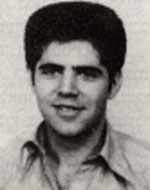Fauster, Moshe
Moshe, son of Zinni and Abraham, was born on 18.9.1954 in Udia, Romania, and immigrated to Israel with his family in 1962. He completed his elementary studies at the Karol School in Petah Tikva. He then went to study at the Ahad Ha’am school in Petah Tikva and completed high school at the Avuka school in Ramat Gan. As a young man, he was a member of Hapoel Petah Tikva and worked in the athletics industry. Moshe was drafted into the IDF in mid-November 1972 and volunteered for the Paratroopers Brigade, and continued to serve in the regular paratroopers position as a rifleman, and was always considered a good soldier and friend. He always took care of his friends and helped them with good advice and action, and when he arrived at the unit he was not physically fit, and at the beginning of his career he had difficulty in his hard journeys and fitness exercises. Gradually, from journey to practice and training He was always one of the best soldiers in the company in terms of ability to carry out his mission, always trying to do his best and keeping the smallest details, and he also contributed to the life of the company outside the training framework, especially by encouraging his friends and creating a social atmosphere. Even during his time in the army he had a camera with him, and he took a lot of photographs during his travels and training. During the Yom Kippur War, his unit participated in battles against the Egyptians on the Sinai front. In the Battle of the Chinese Farm on October 17, 1973, Moshe was hit in the shoulder and put in a position. He continued to fight, but shortly afterwards he was hit by a mortar shell explosion and killed. He was laid to rest in the military cemetery in Kiryat Shaul. Survived by his parents and two brothers. After his fall, he was promoted to corporal. In a pamphlet published in memory of the fallen soldiers of Moshe’s company, one of his friends wrote: “You remember that jolly fellow who took a central place in every incident in the company, in his jokes and especially in his many imitations … You remember how we sat in a circle around, “Moshe raised the high morale department high … We will not forget the image of Moses in a moment of anger at one of the commanders, beat an imitation and immediately burst into laughter, and forget everything.
